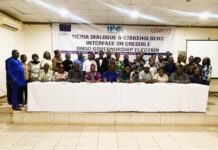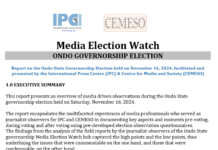
The National Assembly (NASS) has appealed the Federal High Court judgement that it lacked the power to re-order the proposed sequence for the 2019 general elections.
Justice Ahmed Mohammed of an Abuja Division of the Federal High Court, in the judgment, held that the election timetable earlier released by Independent National Electoral Commission (INEC) could not be altered by the legislature.
The suit was filed by Accord Party (AP) against the NASS, attorney- general of the federation and INEC as first to third respondents.
The court held that INEC was the only body constitutionally empowered to organise, undertake, and supervise elections in the country, noting that such responsibility include fixing dates for polls.
The party filed the suit through its counsel, Chief Wole Olanipekun (SAN), after both chambers of the NASS attempted to implement Section 58 of the Constitution, which allows the legislature to override the decision of the president.
AP asked the court to determine if INEC was not solely empowered to carry out its function of overseeing the election timetable in Nigeria.
The plaintiff had sought “A declaration that the 3rd defendant is the only body and or institution constitutionally vested with the powers, vires, and duties to organise, undertake and supervise elections to the offices of the president and vice president, the governor and deputy governor, membership of the Senate, House of Representatives and the House of Assembly of each state, including fixing or assigning dates of the said elections and sequence of same”.
Justice Mohammed, in his judgement delivered on April 25, 2018, noted that the NASS commenced moves to amend the Electoral Act, after INEC had already released its timetable for the impending general elections.
He said the action of the legislature was in clear breach of paragraph 15a of the 3rd Schedule to the 1999 Constitution, as amended.
Justice Mohammed relied on the Supreme court decisions, held that the responsibility of organising elections in the country, was constitutionally vested in INEC, stressing that such statutory right, could not be removed by the legislature through its belated process to amend the Electoral Act.
He held that only INEC had the power to change date that had already been released. Dissatisfied with the lower court’s decision, the NASS, which was the 1st defendant, filed an appeal, asking the appellate court to set aside the decision of Justice Mohammed, and dismiss in its entirety, the plaintiff’s claims in the originating summons.
In the Notice of Appeal filed through its lawyer, Mr. J.B Daudu (SAN), the legislature stated that the learned trial judge erred in
law when he assumed jurisdiction to entertain and determine the suit.
The NASS contended that the trial judge failed to observe and apply the principles and doctrine of separation of powers.
“The trial judge wrongly failed to appreciate that, until the Electoral Act (Amendment) Bill 2018 was passed into an Act by the exercise of the legislative power of the National Assembly to over-ride the veto or withholding of assent to the Bill by the President, the same remained inchoate and not capable of vesting a justiciable civil right or obligation on any person, including the plaintiff.”
NASS further contended, amongst others, that the lower court wrongly interpreted the provisions of Section 4(8) of the 1999 Constitution (as amended), so as to reach the conclusion that the Federal High Court was vested with jurisdiction to impugn a Bill perceived to be unconstitutional.
Meanwhile, INEC has promised to ensure that the 2019 general elections are free, fair and credible and prove critics wrong.
The commission also promised that the July 14 Ekiti State governorship election would be credible. According to the commission, necessary measures have been put place to make sure that the forthcoming polls are better than the 2015 elections.
Chairman of INEC, Prof. Mahmood Yakubu, who made the promises in Lagos at a retreat organized by the electoral body, in collaboration with European Centre for Electoral Supports (ECES), said the 2019 elections had been deliberately planned for great achievement.
“Part of what we have come to do is the implementation of the plans put in place for the forthcoming elections, and this is coming immediately after the completion of the strategic plan, programme of action and the election project plan.”
Yakubu stated that the retreat was geared towards ensuring remarkable improvement on the 2011 and 2015 polls. He expressed confidence that the retreat would make the conduct of subsequent elections in the country better because of its potentials to ensure real-time solutions to election challenges.
The ECES Project Director, Mr. David Le Notre, said: “We are proud to support this laudable initiative which is a continuation of our support towards strengthening strategic policy framework and operational capacity and system of INEC within the contest of component one of the European Union Support to Democratic Governance in Nigeria (EU-SDGN).”















